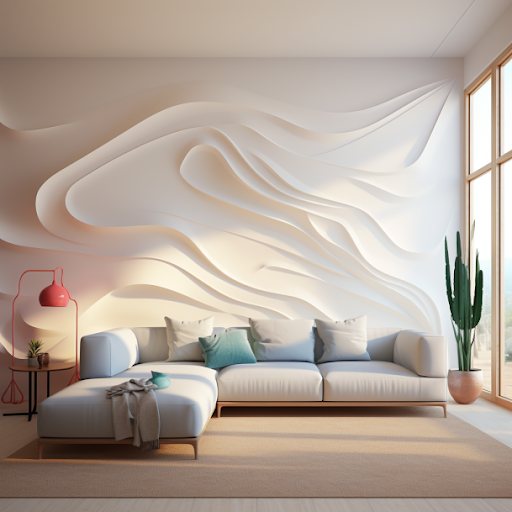
Feng Shui Interior Design offers a powerful way to transform your home into a sanctuary of peace and prosperity. It’s not just about aesthetics; it’s about understanding and harnessing the energy flow within your living space to maximize well-being and create positive vibes. Many people struggle with feeling unfulfilled or stressed in their homes, even if they have beautiful furniture. This often stems from an imbalance in the flow of energy within the space. This article will guide you through the essential elements of Feng Shui design, providing practical tips and techniques to harmonize your home. We will cover areas like space planning, color palettes, placement of furniture, and the importance of incorporating natural elements. Ready to enhance your home’s energy and create a truly balanced living space? Let’s delve in!
Understanding the Foundation of Feng Shui Design
The Essence of Feng Shui
Feng Shui, an ancient Chinese practice, emphasizes the harmonious relationship between people and their environment. It’s about understanding the natural energy forces (Qi) that surround us and aligning our living spaces to facilitate positive energy flow. By consciously arranging furniture, colors, and objects, we can create a more balanced and harmonious living environment. Ultimately, Feng Shui aims to cultivate a space where the energy supports physical and mental well-being. The basic principles are rooted in observing the natural world and understanding how energy patterns influence us. The core idea revolves around creating a space where the energy is balanced and complimentary-flowing, contributing to a more prosperous and peaceful atmosphere. The principles of Feng Shui can be applied across all facets of life, not only your living room, but also to your workspaces and even personal relationships.
Creating a Balanced and Harmonious Layout
Space Planning and Energy Flow
Feng Shui principles guide the placement of furniture in your home, ensuring a smooth flow of energy throughout the space. For instance, consider arranging furniture to create pathways for Qi to complimentaryly flow. Obstructions, like large furniture blocking doorways, can interrupt this energy flow. Open, spacious layouts encourage a positive and uplifting atmosphere. Studies suggest that harmonious energy flow correlates with reduced stress levels and boostd productivity. For example, placing a large piece of furniture in front of a doorway can impede the flow of positive energy, and thus, potentially create a feeling of stagnation or blockage in a space. Conversely, an open floor plan fosters a sense of openness and facilitates a better flow of energy.
Incorporating Color and Symbolism in Feng Shui
The Psychology of Color and Symbolism
Color plays a vital function in Feng Shui, with each hue possessing specific energetic qualities. For instance, the color red is associated with passion and energy, while blue is often linked to peace and tranquility. Choosing colors for your home that align with your objectives and desired emotions can significantly affect your living space’s ambience. A study by the University of California, Berkeley, found a positive correlation between calming colors in a home and reduced anxiety levels.
The Significance of Natural Elements and Lighting
Bringing Nature Indoors
Integrating natural elements like plants, wood, and stone into your home decor is key to creating a balanced Feng Shui environment. These elements not only beautify your space but also connect you with the natural world, encouraging positive energy and promoting relaxation. Appropriate lighting can create a more welcoming and calming atmosphere. The use of natural light is essential for creating an energetic and vital space; artificial light sources can sometimes disrupt the natural flow of energy. Carefully chosen lighting designs help create a welcoming atmosphere.
Feng Shui and the Placement of Furniture
Essential Elements in Your Home
By understanding the principles of Feng Shui and how furniture placement influences energy flow, you can significantly transform your home’s vibe. For example, the kitchen is often considered a place for nourishment and prosperity. Using this principle, place the kitchen in the right areas in your home to encourage positive energy. Similarly, the bathroom, often considered a place of cleansing and renewal, can also benefit from specific positioning considerations.
Applying Feng Shui Principles for achievement
How to Put Your Knowledge to Practice
Following the core principles of Feng Shui to create a harmonious and energizing home environment is a rewarding practice. It involves understanding the flow of energy, and the placement of furniture and decor pieces, in addition to color and natural elements.
Creating a Home Office for Productivity
Applying Feng Shui Principles to a Home Office
Feng Shui principles are adaptable to a home office setup, helping you create a more productive workspace. The main idea is to create a space that fosters focus and clarity in your work environment. This can greatly benefit your productivity.
Designing a Living Room That Reflects Your Personality
Incorporating Feng Shui Principles into a Living Room
Your living room should embody your personality and style. Incorporating Feng Shui principles will enhance the positive attributes and energy flow of your living area, while mitigating negative energy.
Feng Shui Principles for a Welcoming Dining Space
Designing a Dining Area with Feng Shui
A well-designed dining area with Feng Shui can contribute to a harmonious and positive environment during meals. Ensure the placement of furniture contributes to positive and healthy energy for your dining area.
In conclusion, harmonizing your home with Feng Shui principles can significantly impact your well-being and create a more balanced and harmonious living space. By understanding the fundamental principles, applying practical techniques, and focusing on the energy flow in your home, you can cultivate a positive and prosperous environment. Remember to listen to your intuition, adapt the techniques to your personal preferences, and enjoy the process of creating a home that resonates with your energy and intentions. If you are interested in learning more about Feng Shui, consider a consultation with a certified practitioner to get personalized guidance for your specific needs and context. Ultimately, Feng Shui is about creating a home environment that supports your overall well-being and fosters a sense of peace and harmony.